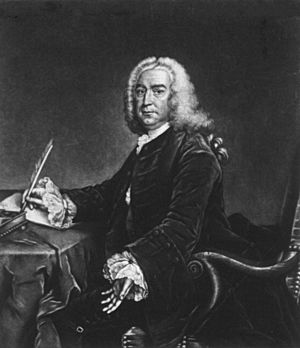Jacob de Castro Sarmento facts for kids
Quick facts for kids
Jacob de Castro Sarmento
|
|
|---|---|
 |
|
| Born | 6 May 1690 Bragança, Kingdom of Portugal
|
| Died | September 14, 1762 (aged 69–70) |
| Nationality | Portuguese |
| Occupation | Physician, naturalist, poet |
Jacob Henriques de Castro Sarmento (born May 6, 1690, in Bragança, Portugal – died September 14, 1762, in London) was a very important Portuguese doctor, scientist, and poet. He was known for his work in medicine and for sharing new scientific ideas.
Contents
Early Life and Studies
Jacob de Castro Sarmento was born in Bragança, Portugal. When he was seventeen, he started studying philosophy at the University of Évora. Later, he studied medicine at the University of Coimbra. He finished his first degree in medicine in 1717.
In 1720, Jacob moved to London. He left Portugal because of difficult times related to religious challenges. In London, he continued his studies. He learned more about medicine, physics, and chemistry. He passed his exams to become a doctor there.
In London, he became a member of the Royal College of Physicians. This is a very respected group of doctors. In 1730, he was also chosen as a fellow of the Royal Society. This honor was given to him because he found a new medicine to help cure fevers. Jacob de Castro Sarmento married Elizabeth, who was not Jewish. He became an Anglican, but he was not formally baptized.
Medical Discoveries and Scientific Work
While in London, Jacob de Castro Sarmento learned about a medicine called quinine. Quinine was very important for treating fevers, especially malaria. Malaria was a big problem in southern Portugal at that time.
Castro Sarmento developed his own version of this medicine. It was called Água de Inglaterra, which means "English Water." This medicine became very popular in Portugal.
He was also interested in plants and nature. In 1731, he created a plan for a botanical garden in Coimbra, Portugal. Botanical gardens are places where different types of plants are grown for study.
Sharing New Ideas
Jacob de Castro Sarmento wrote letters to many other scientists. One of them was Professor João Mendes Sachetti Barbosa in Lisbon. Professor Barbosa told him about the terrible earthquake that destroyed Lisbon in 1755.
He also wrote to Buenaventura Suárez, a Jesuit priest. Suárez shared his observations about stars and planets from Paraguay.
Castro Sarmento was a big supporter of Newtonianism. This was the new way of understanding the world based on the ideas of Isaac Newton. Newton's ideas explained how gravity and motion work. Castro Sarmento tried to connect these scientific ideas with Jewish theology.
He wrote a very important book in Portuguese. It was called Theorica verdadeira das marés, conforme à philosophia do incomparavel cavalhero Isaac Newton. This means "True Theory of Tides, according to the philosophy of the incomparable gentleman Isaac Newton." This book was published in London in 1737. It was the first book in Portuguese to explain Newton's ideas.
Writing and Recognition
Jacob de Castro Sarmento was a very active writer. He wrote about many different topics.
Medical Writings
One of his first medical writings was about vaccination. It was called Dissertatio in Novam, Tutam, ac Utilem Methodum Inoculationis seu Transplantationis Variolorum. This book was published in London in 1721. It was about a new and safe way to prevent smallpox.
He also wrote other medical books, including:
- Historia Medica Physico-Hist.-Mechanica, published in two parts (1731 and 1735).
- Syderohydrologia ó Discurso das Aguas Mineraes Espadañas ou Chalibeadas (1736). This book was about mineral waters.
- A Portuguese translation of a book by the surgeon Samuel Sharp. This book was about surgical operations and the tools used (1744).
Poet and Preacher
Besides his scientific work, Castro Sarmento was also a poet and a preacher. He wrote several religious and poetic works:
- Exemplar de Penitencia, Dividido en Tres Discursos Para ó dia Santo de Kipur (1724). This was a book about repentance for the holy day of Yom Kippur.
- "Sermão Funebre as Memorias do . . . Haham Morenu a R. e Doutor David Neto" (1728). This was a funeral sermon.
- In Spanish, he wrote Extraordinaria Providencia Que el Gran Dios de Ysrael Uso con su Escogido Pueblo en Tiempo de su Mayor Afflicion por Medio de Mordehay y Ester Contra los Protervos Intentos del Tyrano Aman, Deducida de la Sagrada Escritura en el Sequinte Romance (1728). This was a poem about the story of Mordecai and Esther from the Bible.
In July 1739, the University of Aberdeen recognized his important work in medicine. They gave him a medical degree. Jacob de Castro Sarmento was a truly remarkable person who made many contributions to science, medicine, and literature in his time.
 | Toni Morrison |
 | Barack Obama |
 | Martin Luther King Jr. |
 | Ralph Bunche |

